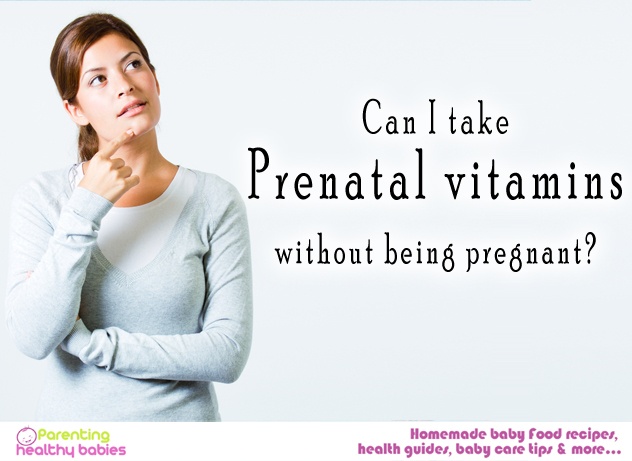There is a lot of allure linked to prenatal vitamins. During pregnancy, there is a famous saying that you need to eat for two. As the nutritional requirements increase, taking prenatal vitamins become a must during pregnancy. Prenatal vitamins ensure a healthy pregnancy and prevent defects like anemia and neural tube bifida.
Having so many benefits, it is only natural to wonder if you should be taking them if you are not pregnant. Women who are planning to conceive are generally advised to take prenatal vitamins. However, if you aren’t thinking to bring a baby into this world, should you be taking prenatal vitamins? Although prenatal vitamins contains all the essential nutrients the body requires, these nutrients should be included in the diet and not through a vitamin pill.
Read More: 10 Must Know Prenatal Vitamins with DHA
What are prenatal vitamins?
Prenatal vitamin supplements are multi-vitamins given to women trying to conceive or those who are already pregnant. Since the woman’s nutritional requirements increase before conception and during pregnancy, it is impossible to supplement everything through diet alone. Hence, prenatal supplements are advised additionally to help women support their rising nutritional requirements.
Prenatal vitamins are just a supplement to a healthy nutritious diet. They cannot replace a healthy diet.
Difference between Traditional Multivitamins and Prenatal Vitamins
While traditional multi-vitamins contain a specific kind of vitamin that is required to solve a particular nutritional deficiency, prenatal vitamins are not the same. Prenatal vitamins contain a combination of all vitamins and minerals. Some of the major ingredients of prenatal vitamins include
- Calcium
- Iron
- Folic Acid
- Omega-3-DHA
- Copper
- Zinc
- Vitamin A, C, and E
- Riboflavin
- Thiamine
- Niacin
Pros of Taking Prenatal Vitamins When not Pregnant
1} For women who plan to become pregnant soon
Prenatal vitamins create a healthy environment to conceive a baby. Certain prenatal vitamins like 400 mcg of folic acid is advised to women when they are planning to conceive and are encouraged to take it throughout pregnancy. Prenatal vitamins help prevent birth defects in new born and assure a healthy pregnancy to the mother.
2} Encouraged post-delivery
Prenatal vitamins are advised to a woman even after delivery of the baby. It is generally recommended during breastfeeding so that the mother gets all the essential nutrients for both herself and her baby.
Cons of Taking Prenatal Vitamins When not Pregnant
Too much folate has side effects
Although folic acid is absolutely essential for women who are pregnant and trying to conceive, too much of it can have several side effects. Some warning signs include nausea, bloating, gas, lack of appetite, indigestion, sleep disturbances, irritability, and bitter taste in the mouth.
Excess Iron
Prenatal vitamins are rich in iron, and too much of iron apart from that in the diet can cause nausea, vomiting, and constipation. Women who are planning to conceive or already pregnant should consult a doctor for the right dosage of iron.
Inadequate calcium
Relying on prenatal supplements alone for calcium can result in a severe deficiency. Prenatal vitamins only contain about 200 to 300mg of calcium, whereas about 1000 mg of calcium is required daily. Hence, it is more advisable to ingest more calcium through the diet and not depend only on supplements.
Liver damage
Since prenatal vitamins have high dosage of iron in them, this could be potentially dangerous for the liver. Iron can be toxic to the liver and its overdose can cause diarrhea, nausea, and severe gastric bleeding.
Neurological damage
Most prenatal vitamins contain folate and other vitamins except Vitamin B12. Continuous intake of prenatal supplements can cause a deficiency in Vitamin B12. B12 deficiency can show symptoms like numbness, anemia, memory loss, high heart rate, poor concentration, and tingling in the hands and feet. Over a period of time, these symptoms can also lead to neurological damage.
When should I take prenatal vitamins?
It is always advisable to consult a doctor before taking prenatal vitamins. Only if you are trying to conceive or already pregnant, your doctor will advise you to take prenatal vitamins. Doctors also recommend breast-feeding mothers to take prenatal vitamins to meet nutritional requirements.
Many women claim that taking prenatal vitamins help them grow thicker hair and nails. However, these claims have not been proven. Taking prenatal vitamins unnecessarily can have adverse side effects that cannot be controlled. Hence, it is advisable not to take them without seeking medical advice.
Anything in excess is not good. The same goes for prenatal vitamins too. If you are not pregnant, and are not planning to any time soon, it would be a better idea to evaluate your diet first. Taking a healthy and nutritious diet is much better than popping a multi-vitamin pill. A balanced diet contains fresh veggies, fruits, lean proteins, carbs, dairy, fat, and whole grains. This is completely sufficient for a woman who is not pregnant and who is not planning to conceive.
Read More: 7 Natural Prenatal Vitamins You Cant Do Without
References
http://www.healthline.com/health/pregnancy/prenatal-vitamins-not-pregnant#4
